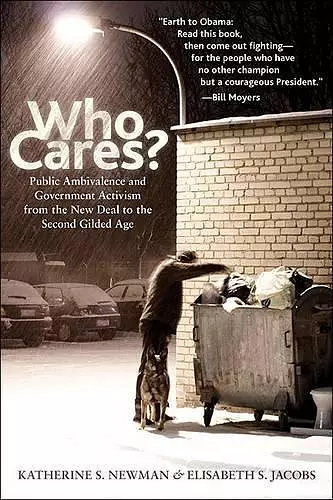Who Cares?
Public Ambivalence and Government Activism from the New Deal to the Second Gilded Age
Katherine S Newman author Elisabeth S Jacobs author
Format:Hardback
Publisher:Princeton University Press
Published:16th Apr '10
Currently unavailable, and unfortunately no date known when it will be back

This insightful book reveals the ambivalence Americans feel towards social welfare, challenging the notion of unwavering support for the less fortunate. Who Cares? highlights the need for bold leadership.
In Who Cares?, authors Katherine Newman and Elisabeth Jacobs delve into the complex relationship Americans have with social welfare. The narrative challenges the prevailing notion that Americans are inherently compassionate, particularly during times of crisis such as the Great Depression and the Great Society. Through an analysis of opinion polls and correspondence with presidents, the authors reveal a more nuanced and often critical public attitude toward the poor and unemployed. This exploration uncovers a historical ambivalence that contradicts the collective memory of solidarity and support for the vulnerable.
The book highlights how public sentiment towards social programs has fluctuated over the decades. Notably, some policies that are now taken for granted faced significant opposition shortly after their implementation. The authors argue that even well-established welfare initiatives can be met with skepticism, as seen during the conservative backlash in the 1980s and 1990s. Leaders like Roosevelt, Johnson, Nixon, and Reagan often had to navigate a landscape of public resistance, yet their legacies were shaped by their willingness to lead despite opposition.
Ultimately, Who Cares? emphasizes the importance of presidential leadership in addressing social issues. It suggests that while Americans may express ambivalence towards the welfare state, they also have the capacity to support initiatives that benefit the less fortunate—provided these programs demonstrate their value over time. The book serves as a crucial reminder that effective governance requires courage and vision, especially in a climate of divided public opinion.
"All who are interested in US public opinion concerning the role of government in support of social programs and the role that leaders can play in supporting or dismantling such programs should read this brief, timely, and well-written gem."--Choice "[I]n analyzing public opinion in three distinct periods of American political history, Katherine Newman and Elisabeth Jacobs set out some interesting observations for contemporary policy-makers."--Alastair Hill, LSE British Politics and Policy blog "The authors raise important questions about public opinion, policy making, and democracy. Scholars exploring shifts in the American safety net and American politics more generally will have to attend to the authors' arguments and their careful synthesis of public opinion data. Lay audiences and policy makers will find a useful and provocative, though quite general, overview of welfare state development alongside a passionate call for progressive political leadership to address the economic inequality and insecurity of the 'second gilded age.'"--Marisa Chappell, Journal of American History "Who Cares? makes a contribution by providing a concise history of the interplay between the development of antipoverty policy initiatives and public opinion since the New Deal and by demonstrating consistent themes in attitudes toward the welfare state."--Tracy Roof, Perspectives on Politics
ISBN: 9780691135632
Dimensions: unknown
Weight: 454g
240 pages